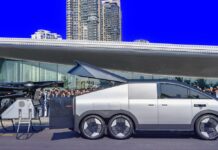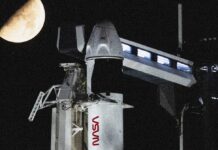02:56
In April, Guardian Australia first reported that Bunnings Warehouse was willing to host mass vaccination hubs at its stores.
At the time, epidemiologists told Guardian Australia the idea could nudge people who did not consider vaccination as a matter of urgency into getting the jab – noting researchers had separately found that Bunnings is considered Australia’s most trusted brand.
They also said the spread of stores across suburbs, and carpark facilities, meant the hubs would complement state health offerings.
Bunnings’ offer has now been taken up by the Queensland government, as that state’s health authorities seek out ways to ramp up local vaccination rates that are trailing other jurisdictions.
You can read our initial report from April here.
02:17
Nationals MP David Gillespie has spoken to ABC TV about the emissions reduction negotiations in the Coalition, arguing that the Nationals aren’t putting a “pricetag” on net zero but ensuring the policy “won’t disadvantage the whole nation”.
He said:
Some people have said they are just worried about regional Australia, I have some concerns about unintended consequences of this target which could destroy the livelihoods of many industries, including our energy system, reduce agriculture, mining.
Gillespie then labelled net zero by 2050 a “catchphrase”. Host Patricia Karvelas noted, no, it describes what will hopefully become a physical reality that we are not adding greenhouse gases to the atmosphere.
Gillespie explained that he meant that there would need to be a “replacement source of energy” for fossil fuels, such as high efficiency coal power stations with carbon capture and storage.
Oh, but those are still fossil fuels, and that isn’t net zero. The clue is in the catchphrase, I would’ve thought.
Asked if the Coalition could split over the issue, Gillespie replied that “I don’t think that is being countenanced”.
He said:
We will sort it out. We have to see what is on offer first. If you remember, we went to an election last election, 2019. Yes, a lot of changes in a week in politics let alone three years. The analysis then was that it would cost several hundred thousand jobs and $350 billion in taxes.
Good point – at least someone remembers when emissions reduction was job destroying and terrible (when Labor proposed it). Gillespie then spoke about the need for technology like carbon capture and storage, and hydrogen, but they were out of time so the segment ended.
Updated
02:03
A Senate committee chaired by Liberal Claire Chandler has rejected One Nation’s bill proposing introduction of voter identification laws.
In December 2018, the government backed voter ID laws in a review of the 2016 election.
One Nation’s Malcolm Roberts tried to take that proposal of the joint standing committee on electoral matters and turn it into a private senator’s bill.
In a report released on Thursday the Senate finance and public administration committee recommended the bill not be passed. It said:
While the committee acknowledges that the bill is seeking to strengthen the integrity of elections, and notes the Jscem’s support for voter identification laws in principle, there remain a number of administrative issues which are raised by the bill but not properly addressed by its provisions or explanatory material.
So, no backdown from the Coalition on voter ID laws, just: this isn’t the way to do it.
In additional comments both Labor and the Greens set out their opposition to voter ID laws on the basis they would disenfranchise vulnerable voters.
Labor senators said:
As the majority of submitters to this inquiry have pointed out, there is no culture of voter fraud in Australia and without further evidence, there is no justification for voter identification laws.
Updated










